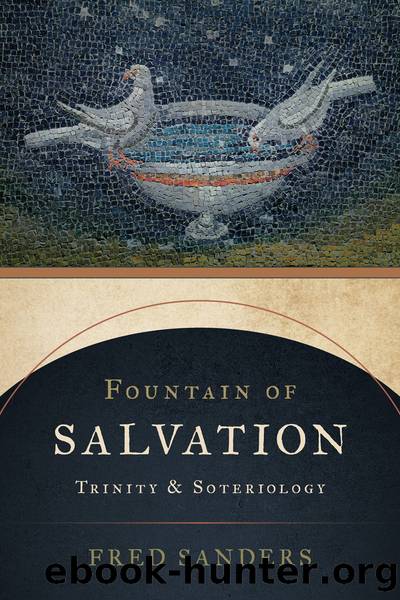Fountain of Salvation by Sanders Fred;

Author:Sanders, Fred;
Language: eng
Format: epub
Publisher: Wm. B. Eerdmans Publishing Co.
Published: 2021-11-15T00:00:00+00:00
THREE CONNECTING THEMES FOR TRINITARIAN SOTERIOLOGY
With these motivations clarified, we turn now to three themes that illuminate the close connection between eternal generation and the gospel: first, metaphysical sonship; second, being from the Father; and third, considering God relatively.
âSee what kind of love the Father has given to us, that we should be called children of God; and so we are.â7 The Christian experience of adoption to be children of God is founded on a reality, rather than ventured from a figure of speech. Speaking in terms of literary craftsmanship, the concept of sonship may be thought of as a powerful metaphor, one that serves especially well to integrate and focus the entire semantic domain of biblical language about family, household, and inheritance. But sonship is also more than a metaphor, because naming the Christian experience of salvation by the name adoption (whether as âson-makingâ or as âplacing in the position of a sonâ) is not an exercise in evocative metaphorical description. It instead descends from that Father [patÄr] from whom every fatherhood [patria] in heaven and on earth has its name.8 The relation of Father to Son is a relation in God, which is brought down to or given over to us; or, to say the same thing, into which we are exalted and incorporated. âMultitudes of us,â says Hilary of Poitiers, âare sons of God; He is Son in another sense. For he is Godâs true and own Son, by origin and not by adoption; not in name only but in truth; born and not created.â9 Or as the Heidelberg Catechism asks and answers: âWhy is He called Godâs only begotten Son, since we also are the children of God? Because Christ alone is the eternal, natural, Son of God; but we are children of God by adoption, through grace, for his sake.â10 The relation of sonship is his by definition and ours by some kind of extension of the termâs meaning, on the basis of a gracious and costly exchange. If we are to call soteriological sonship metaphorical in any sense, it would be in a sense that demands metaphysical grounding in trinitarian sonship. The doctrine of eternal generation is what specifies the metaphysical foundation behind the metaphorical extension of sonship to us.
At some times in the history of trinitarianism, theologians have considered whether it might be adequate to stop at the assertion of mere sonshipâcoeternal, coequal, metaphysical sonshipâinstead of going on to the language of begetting or eternal generation. The proper response is that much would be lost, obscured, and rendered inarticulate by stopping short of generation. William Burt Pope put it this way:
Those who would efface the interior distinctions of generation and procession in the Godhead surrender much for which the earliest champions of orthodoxy fought. They take away from the intercommunion of the divine persons its most impressive and affecting character; and they go far toward robbing us of the sacred mystery which unites the Sonâs exinanition in heaven with his humiliation as incarnate on earth.
Download
This site does not store any files on its server. We only index and link to content provided by other sites. Please contact the content providers to delete copyright contents if any and email us, we'll remove relevant links or contents immediately.
Machine Learning at Scale with H2O by Gregory Keys | David Whiting(4314)
Never by Ken Follett(3960)
Fairy Tale by Stephen King(3401)
Reminders of Him: A Novel by Colleen Hoover(3122)
The Man Who Died Twice by Richard Osman(3082)
Will by Will Smith(2924)
It Starts With Us (It Ends with Us #2) by Colleen Hoover(2370)
Rationality by Steven Pinker(2368)
Can't Hurt Me: Master Your Mind and Defy the Odds - Clean Edition by David Goggins(2344)
Friends, Lovers, and the Big Terrible Thing by Matthew Perry(2234)
The Becoming by Nora Roberts(2207)
The Stranger in the Lifeboat by Mitch Albom(2127)
Love on the Brain by Ali Hazelwood(2080)
New Morning Mercies: A Daily Gospel Devotional by Paul David Tripp(1920)
A Short History of War by Jeremy Black(1851)
The Strength In Our Scars by Bianca Sparacino(1847)
HBR's 10 Must Reads 2022 by Harvard Business Review(1847)
A Game of Thrones (The Illustrated Edition) by George R. R. Martin(1751)
Never Finished: Unshackle Your Mind and Win the War Within by David Goggins(1715)
